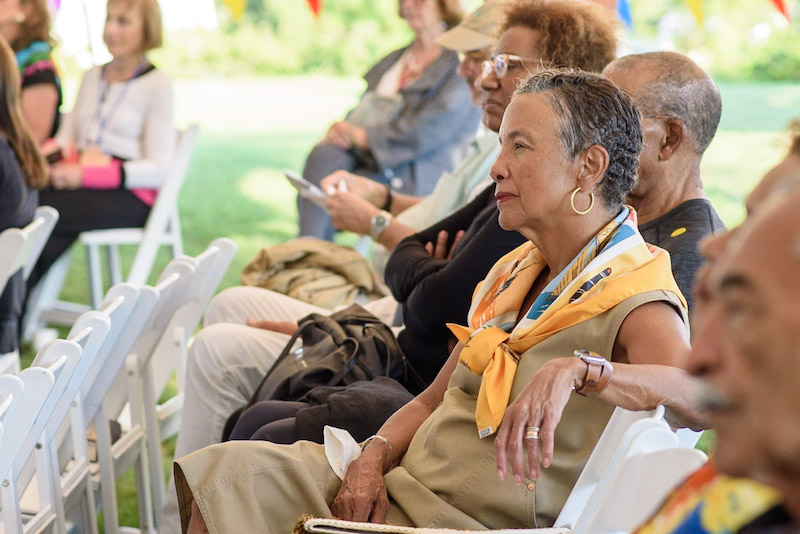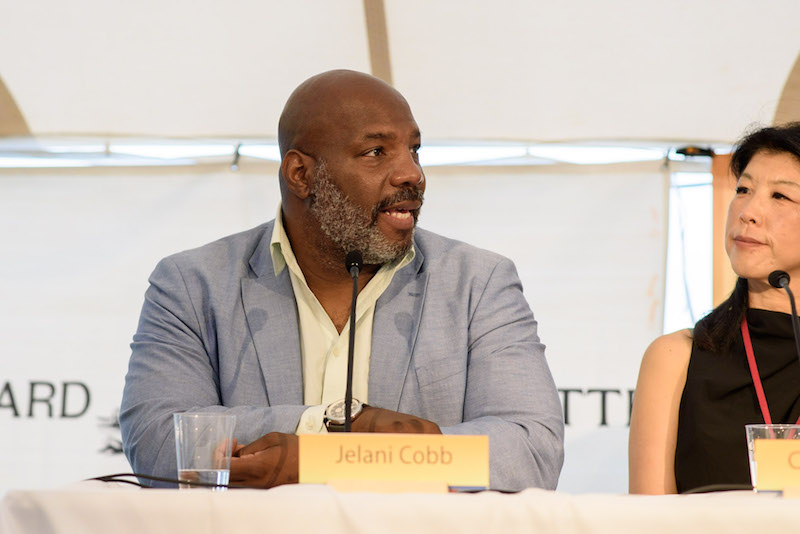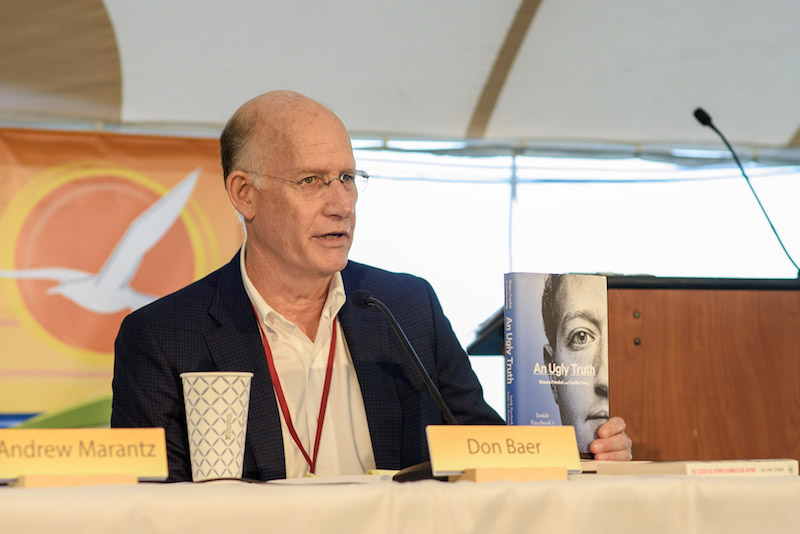A Martha’s Vineyard Book Festival audience turned out Friday evening for a panel discussion on the Martha’s Vineyard Museum lawn with three of the country’s leading journalists, co-hosted by the Gazette as part of its 175th anniversary this year.

New Yorker magazine staff writers Jelani Cobb and Andrew Marantz and New York Times technology reporter Cecilia Kang joined longtime Public Broadcasting System chairman Don Baer for a wide-ranging, often sobering conversation titled Can Journalism Survive?
“Journalism is the only profession specifically prescribed in the constitution, and that is because we are supposed to have a role in the upholding of democracy,” Mr. Cobb said at the outset. “That’s one of the things that we’ve lost sight of.”
The basic definition of journalism is the gathering and dissemination of information in the public interest, said Mr. Cobb, who is also a professor at the Columbia Journalism School and a 2018 finalist for the Pulitzer Prize for Commentary.
Mr. Baer moderated the discussion.
All the panelists spoke about how the profession is undergoing rapid changes, particularly with the use of data and technology.
“The idea of journalism, and how you go about gathering that information in the public interest, is expanding and evolving and developing so astoundingly rapidly that from one year to the next, what we are teaching our students is not the same,” said Mr. Cobb.
Technology is also transforming the way people get the information they receive as news, said Ms. Kang, a 2018 Pulitzer finalist for her reporting on Facebook.
She said giant social media companies have an interest in allowing disinformation to spread between users. Her new book is An Ugly Truth: Inside Facebook’s Battle for Domination.
“They’re in the business of agita,” Ms. Kang told the audience, using an Italian-American term for feeling upset.
“They want to agitate you, whether it’s making you angry, or happy, or scared, or sad, or what have you, because that’s what makes you click. That’s what makes you like and share,” she said.
The way they do it — how the algorithms that serve content to users are designed — remains a closely-guarded secret, she said.
“None of this is transparent,” Ms. Kang said. “Researchers are really eager to get behind the curtain and figure this out.”
Tech companies know exactly what they’re doing when their algorithms prioritize misinformation over straight reporting, said Mr. Marantz, whose latest book is Antisocial: Online Extremists, Techno-Utopians, and the Hijacking of the American Conversation.

“Their fundamental lifeblood is virality,” he said. “You have to replicate faster than you decay.”
The concept of the internet as a neutral public square is long outdated, he said. “We’ve entered into an era when the way we’re all being assaulted by information all the time is algorithmically engineered for profit to disinform us and to weaken.
“[It’s] almost literally a conspiracy to get people not to pay attention.”
The level of public discourse has also declined, said Mr. Baer.
“We live in the world that it has wrought,” Mr. Marantz responded. “[Social media companies] are becoming gatekeepers without acknowledging or taking on the responsibility that comes with that . . . any time you take on power and then abdicate responsibility for it, disaster is going to ensue.”
Another concern, Ms. Kang said, is the sheer volume of content — true and false — circulating as news.
“The challenge is, there is too much information there,” she said. “I think we have to figure out where our role is in this information glut.”

Along with the warping influence of social media networks, a steep decline in advertising and a massive dropoff in employment have hit the journalism industry in the 21st century. Mr. Baer shared statistics: Google and Facebook now command about 85 per cent of all media advertising, while newspaper advertising revenue has dwindled from $50 billion in 2005 to $9 billion in 2020, wiping out more than half the jobs along the way.
“It just basically hollowed out the business model,” Mr. Baer said.
While none of the panelists was ready to write journalism’s obituary yet, Mr. Marantz voiced larger qualms.
“I worry much more about the survival of our democracy now,” he said. “The structural forces that want to unravel American democracy are only getting stronger.”
Still, he held out hope in the very fickleness of American culture, noting that just a few years ago, powerful tech-company owners were hailed as visionaries, while now they’re viewed very differently.
“Social media founders had halos,” Mr. Morantz said. “Now they’re on wanted posters. These things can change pretty rapidly.”
Ms. Kang said journalists will continue to hold powerful people to account.
“It’s pretty simple,” she said. “My mandate is to inform.” And recycling other people’s reporting doesn’t meet that standard, she said.
![Andrew Marantz: “[Social media companies] are becoming gatekeepers without acknowledging or taking on the responsibility that comes with that .”](https://vineyardgazette.com/sites/default/files/article-assets/main-photos/2021/_jps1507.jpg)
“If you don’t have something that’s fresh and important and insightful to say . . . then [don’t report it],” she said.
Mr. Cobb said he still has confidence in people who believe in democracy.
“Despair is the real enemy of democracy and freedom, and I believe we are not at a point where despair is warranted,” he said, drawing applause.
The panel was followed by two days of book festival events in Chilmark, where Ms. Kang and Mr. Marantz were among Saturday’s speakers.
The Gazette and the museum team up again on Wednesday at noon for another journalism panel on the lawn, co-hosted by Cook the Vineyard and titled The Changing Story of American Home Cooking.
Gazette special projects editor Susie Middleton will moderate a conversation among Bon Appetit editor in chief Dawn Davis, New York Times food editor Sam Sifton and historian and author Jessica B. Harris, a seasonal Oak Bluffs resident who recently received a James Beard Lifetime Achievement Award.








Comments (3)
Comments
Comment policy »